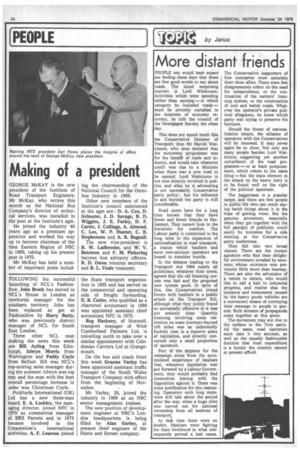More distant friends
Page 26

If you've noticed an error in this article please click here to report it so we can fix it.
PEOPLE one would least expect are finding these days that there are few good words to say about roads. The latest surprising convert is Lord Watkinson. Activities which were spending rather than earning in which category he included roads — must be severely curtailed in the interests of economy recovery, he told the council of the Newspaper Society the other day.
This does not sound much like the Conservative Minister of Transport, then. Mr Harold Watkinson, who once declared that the motorway programme was for the benefit of trade and industry, and would take whatever credit was due to a Minister when there was a new road to he opened. Lord Watkinson is not now directly involved in politics, and what he is advocating is not necessarily Conservative party policy ; but his influence in and beyond the party is still considerable.
Road users, have for a bong time known that they have fewer and fewer friends in Parliament. They cannot look to the Socialists for comfort. The Labour party is committed in the long term to •the expansion of : nationalisation in road transport, a stance which hauliers and most own-account operators are bound to consider hostile.
In the debates leading to the Transport Act 1968 nearly all politicians, whatever their creed, agreed that the old licensing system was bad and the proposed new system good. In spite of this, the Conservatives joined forces with hauliers in a public attack on the Transport Bill, although what they jointly found so universally offensive in it was not entirely clear. Quantity licensing involving some restriction on some journeys beyond 100 miles was an (admittedly foolish) .item in a massive piece of legislation, and directly concerned only a small proportion of operators.
Part of the impetus for the campaign arose from the accumulated experience of hauliers that, whenever legislation was put forward by a Labour Government, they would probably find themselves joining with the Opposition against it. There was some justification for this reason ii Operators with long memories Still talk about the period after the war, when a huge slice was carved out for national ownership from all sections of transport.
At that time there were no doubts. Hauliers were fighting for their livelihood in what subsequently proved a just cause. The Conservative supporters of free enterprise were naturally their close allies. There were few disagreements either on the need for Independence, or the continuation of the carriers' Licensing syStem, or the construction of new and better roads. Whatever the operator's private political allegiance, he knew which party was trying to preserve his business.
Should the threat of nationalisation return, the alliance of operators With the Conservatives will be renewed. It may never again be so close. Not only are many people +besides Lord Watkinson suggesting yet another curtailment of the road programme — or at least postponement, which comes to the same thing —but the main element in the attack on the heavy lorry is to be found well on the right of the political spectrum.
The juggernaut is a popular target, and there are few people in public life who can resist saying harsh 'things about it in the hope of getting votes. But the genuine protesters, especially when they get together with the, full panoply of publicity, could easily be mistaken for a side meeting at the Conservative party conference.
They fall into two broad classes. There are the instant agitators who find their delightful environment invaded by monsters whose existence was previously little more than hearsay.. There are also the advocates of a return to nature, who would like to call a halt to industrial progress, and 'realise that the nuisance and resentment caused by the heavy goods vehicles are a convenient means of conveying their message to people in general. Both streams of propaganda come together at this point.
The movement may not rise to the surface in the Tory Party. All the same, road operators must take it into account, as well as the equally fashionable doctrine that road expenditure is a luxury the country cannot at present afford.








































































































